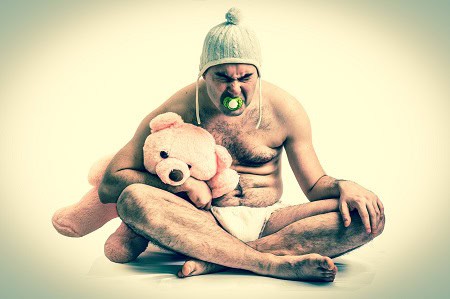Infantilizing Addiction
 “Go to your room and calm down… Wake up, breakfast is ready… Are you gonna’ sleep all day?… You can’t have candy in your room… It’s 10 o’clock, lights out, it’s bedtime…”
“Go to your room and calm down… Wake up, breakfast is ready… Are you gonna’ sleep all day?… You can’t have candy in your room… It’s 10 o’clock, lights out, it’s bedtime…”
The Practice of Infantilizing Addiction
The statements above are just a few of the endless parade of childish remarks that are hurled at grown adults constantly at rehabs everywhere. I’ve seen airline pilots, engineers, physicians, and CEOs talked down to like they’re a junior high trouble maker almost as many times as I’ve heard cliché’s masquerade as treatment. Women and men with children, careers, and a long and established history of responsible, productive contribution to society are treated no differently than a 19-year-old who smokes heroin in treatment to defy his parents and get back at them for restricting access to the trust fund.
What’s Behind Infantilizing Addiction?
I blame the insulting treatment of responsible adults who seek help for a substance use problem on the unfounded claim that all addicts are the same. A failure to launch twenty something with little internal motivation to change is not quite the same as a pilot who successfully launches and lands commercial airliners and drinks to manage stress. Sometimes stressful lives result in stress relief methods that don’t have the best long-term consequences. Treating people who genuinely want to change like we’re middle school hall monitors with our first taste of power is, so far, not evidence-based.
It’s Unethical Treatment
Lumping everyone who goes to treatment together is not only severe mental laziness, it is unethical treatment. Every type of cancer does not get the same treatment. Every type of flu does not get the same treatment. All the various manifestations of depression, anxiety, and bipolar do not receive the same treatment. I’ve witnessed the discrepancy play out in various treatment settings between those who really want help and those who are going through the motions. When people who want help and take treatment seriously are consistently placed in groups with class clowns who make light of and challenge everything to entertain themselves, those who are taking treatment seriously often shut down. It doesn’t make sense to take the risk of being vulnerable when you’re likely going to get a sarcastic remark from someone with a quarter of your life experience.
Ditching the Druggie Daycare Mindset
To be clear, not all teenagers and twenty-somethings are unmotivated, not all middle-aged folks take treatment seriously. Discretion, sensitivity, and discernment – hallmarks of quality, individualized care – are all but absent in the treatment of addiction. Responsible adults who get in over their heads with a substance don’t need a druggie daycare. While many would probably disagree, I would argue that the failure to launch folks who head off to rehab are also done a disservice by authoritarian care, which only perpetuates their dynamic of rebellion. Giving people freedom in treatment (e.g. keeping cell phones, not limiting movies to PG rating, etc) puts the responsibility for their own lives on their own shoulders, which is kind of the reality of our existence. Rather than telling adults they are acting out, or misbehaving, it might be more effective to ask them how their behavior was helping them achieve their goals.
If you or a loved one are in need of compassionate, caring rehab for addiction, please give us a call. We are here to help.
